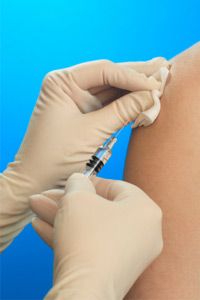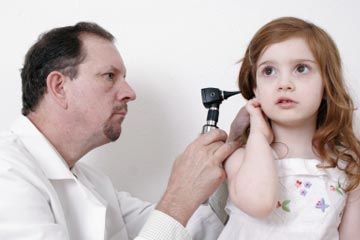Behind the scenes of private medical practices across the United States, a battle has been raging with insurance companies over reimbursement practices. The fight is specifically regarding the amount of money a doctor or practice gets back from an insurance company for biologics, or drugs that are derived from living organisms. Vaccines fall into this category, since most vaccines are composed of a form of the very virus they're protecting against. The battle seems to have come to a head with Gardasil, the "cervical cancer vaccine" that protects against strains of the human papillomavirus (HPV) that cause 70 percent of cervical cancers. And cervical cancer kills almost 4,000 women every year in the United States alone. Worldwide, the number could be in the hundreds of thousands. So Gardasil is a big deal. But many people are finding it difficult to get their daughters injected with it.
The problem appears to be about a medical reimbursement practice called "buy and bill," which has had doctors and insurance companies at odds for a number of years now (more at odds than usual).
Advertisement
The thing about biologics is that they tend to be very expensive, and Gardasil is the most expensive vaccine ever to hit the market. It's administered in three separate doses over a period of about six months, and each dose has a retail price of $120. But it's not only expensive to buy; all biologics are expensive to stock. Doctors, in order to make a profit on administering a vaccine, need to recover from the patients' insurance companies more than just the cost of the administered vaccine itself. Medical offices also need to recover the cost of ordering and shipping the vaccine, refrigerating it, insuring it against a refrigeration malfunction, theft or damage, purchasing the needles to administer it, paying the nurses who care for the patient before, during or after the vaccination, and any other costs associated with administering a biologic.
So that's the first part of the equation: Doctor's expenses in stocking vaccines, and stocking the $360-per-patient Gardasil in particular. Traditionally, doctors shell out the money from their own pockets and then bill the insurance companies as they administer the vaccine to patients. Insurance companies, in turn, have typically reimbursed doctors anywhere from 10 percent to 17 percent over the retail cost of the vaccine to cover their additional expenses in stocking it. But in recent years, insurers have been cutting that reimbursement -- that's the second part of the equation. In the case of Gardasil, brought to market by Merck in June 2006, most insurance companies have been reimbursing doctors $120 per dose -- the retail cost of the vaccine. The insurance companies, for their part, are fighting what they see as excessive reimbursement for biologics. Their position, highly simplified, is that since many doctors buy vaccines in bulk and are therefore getting it for less than retail, doctors are already recovering their additional storage and administration costs when they receive payment for the retail price of the vaccine. They say they have been over-reimbursing doctors for decades. But some doctors claim that in this case, Merck is not offering the usual cost cut for the type of bulk orders a small practice might place. We're not talking 100,000 doses here; we're talking maybe 50 for a large pediatrician's office.
So doctors -- pediatricians in particular, who tend to stock the most vaccines of all medical specialists -- and insurance companies appear to be in a deadlock. Pediatricians claim they simply can't afford to stock Gardasil since they're not getting reimbursed for all of their expenses. For some, stocking the drug would mean operating at a loss or barely breaking even. And most insurance companies, who have been trying to change the biologics-reimbursement situation for years now, are standing their ground at $132 per dose (called "ASP+6," or "average selling price plus 6 percent"), saying that doctors are demanding over-reimbursement. And in the meantime, many people who can't afford to shell out up to $400 to get their daughter(s) vaccinated are left running from pediatrician's office to public health clinic to gynecologist's office and back again trying to find someone who has Gardasil.
As of February 2007, at least two major insurance companies -- Horizon Blue Cross Blue Shield (New Jersey) and Cigna Healthcare -- have backed down and agreed to provide the traditional biologics reimbursement for Gardasil. Horizon is now paying a total of $171.50 per dose. In some cases, pediatricians' offices that do stock the vaccine are charging patients a fee for administering it, in case the patient's insurance company doesn't reimburse their full costs. The federal government has recently purchased more than a million doses for girls who are covered by Medicaid, and some states are paying for it themselves and offering it for free, including Texas (which has made vaccination with Gardasil mandatory for girls), Washington and New Hampshire.
For more information on Gardasil and related topics, check out the next page.
Advertisement


